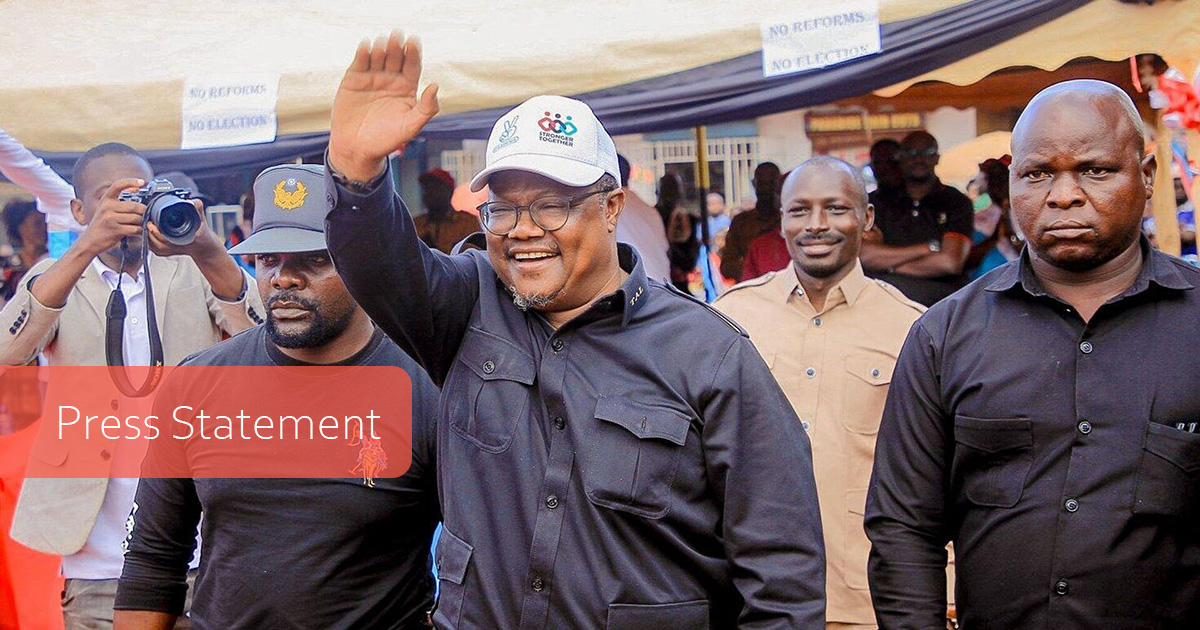Date: 15 April 2025
Issued by: Centre for Human Rights, Faculty of Law, University of Pretoria
The Centre for Human Rights, Faculty of Law, University of Pretoria expresses deep concern over the escalating threats to democracy, political participation, and electoral integrity in Tanzania. The arrest of opposition leader Tundu Lissu, alongside the disqualification of the CHADEMA party from the 2025 general elections signals a disturbing regression in political freedoms and democratic governance.
Tundu Lissu, Vice-President of CHADEMA, was arrested on 3 April 2025 in Mbinga District during a peaceful rally calling for electoral reforms. The authorities allege that Lissu 'formed an intention to incite the public' to obstruct the 2025 General Elections and manifested this intention 'by intimidating the Executive' through his public statements and social media commentary. This charge, brought in the context of a public demonstration for fair elections, reflects an alarming misuse of state power to silence political opposition.
Such repression undermines fundamental democratic principles. Criminalising peaceful protests and political participation, especially in an election year, has far-reaching implications for the legitimacy of the entire electoral process and the need to uphold democratic principles. A democracy cannot thrive if political actors are excluded, intimidated or arbitrarily detained.
The Centre is particularly alarmed by the Independent National Electoral Commission's decision to exclude CHADEMA from participating in the elections until 2030, citing the party's alleged failure to sign the 2025 Code of Ethics. This exclusion is both high-handed and legally questionable, and raises fundamental concerns about the independence, impartiality and transparency of Tanzania's electoral body.
The right to political participation is a cornerstone of democratic governance. Article 21 of the Constitution of the United Republic of Tanzania states that 'every citizen shall have the right and freedom to participate fully in the process of deciding matters affecting him or her, his or her welfare or the nation', including the right to vote and to be elected. The disqualification of a major opposition party and the persecution of its leadership is a clear violation of this constitutional guarantee.
Furthermore, Article 13 of the African Charter on Human and Peoples’ Rights guarantees the right of every citizen to participate in the government of their country. More importantly, Article 2 (10) of the African Charter on Democracy, Elections and Governance obligates States Parties to 'promote the establishment of the necessary conditions to foster citizen participation, transparency, access to information, freedom of the press and accountability in the management of public affairs'. The Tanzanian government's current actions are in direct contravention of these regional standards.
These developments point to a wider democratic recession characterised by shrinking civic space, the erosion of fundamental freedoms and the weakening of institutions designed to uphold political pluralism. Freedom of expression, assembly and association are essential to ensure meaningful public participation in democratic life. Their suppression not only violates individual rights but also threatens the credibility and fairness of the upcoming elections.
In light of these grave concerns, the Centre:
- Demands the immediate and unconditional release of Tundu Lissu and the withdrawal of all politically motivated charges;
- Urges Tanzanian authorities to uphold the Constitution as well as regional norms and standards by protecting the rights to political participation, assembly, and association, without discrimination or undue restriction;
- Calls for the reinstatement of CHADEMA’s right to participate in the 2025 general elections, ensuring an inclusive, competitive, and fair democratic process;
- Insists the Independent National Electoral Commission operate with full neutrality and transparency in line with its constitutional and legal mandate; and
- Appeals to the African Union, regional human rights mechanisms, and the international community to engage urgently with Tanzanian authorities to prevent further democratic backsliding and to safeguard electoral legitimacy.
Peaceful political advocacy is not a threat to national security; it is a necessary expression of democratic engagement. Tanzania’s electoral process must reflect the will of its people, not the unchecked dominance of state power. The legitimacy of the 2025 general elections—and the future of democratic governance in Tanzania—hangs in the balance.
For media inquiries or further information:

+27 (0) 12 420 4199
bonolo.makgale@up.ac.za


